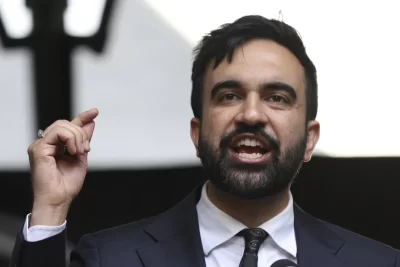
WASHINGTON — Never before in a presidential election cycle has there been so much discussion of the child tax credit — a tool many Democrats and Republicans have endorsed as a way to lift children and young families out of poverty.
Just three years ago, child poverty rates fell significantly when President Joe Biden’s administration raised the child tax credit and made even the poorest families eligible. But the expansion only lasted a year. Congress declined to renew it.
There is hope for another increase in the tax credit, regardless of who wins Tuesday’s presidential election, but tension remains over who should qualify.
Democrats seek a massive — and costly — expansion of the social safety net. Vice President Kamala Harris has pitched a major increase to the child tax credit as part of her presidential campaign. Rather than providing the benefit through a tax refund, she wants to send monthly payments to parents, even those who aren’t working and pay no income tax. Republicans have expressed support for increasing the tax credit but also concern that for some parents, it could become an incentive not to work.
For all its economic prosperity, childhood poverty remains pervasive in the United States. Children under 5 are the age group most likely to encounter poverty and eviction, and more than one in six young people under 18 live below the federal poverty line. Meanwhile, it’s getting more expensive to raise a child, with the cost of groceries, child care and housing going up.
“Expanding the child tax credit is the single most effective option on the table for reducing child poverty in America,” said Christy Gleason of Save the Children, a global humanitarian organization focused on the well-being of children. “Families are demanding it. Voters are demanding it.”
Currently, the child tax credit gives families a $2,000 discount on their tax bill for every child under the age of 17 in their care. Families that pay less than $2,000 in income tax get a smaller benefit, and parents who are out of the workforce get none.
Harris has made expanding the tax credit central to her campaign’s messaging on the economy. Her running mate, Minnesota Gov. Tim Walz, has a resume that includes passing a state child tax credit.
Former President Donald Trump doubled the amount of the child tax credit during his administration. His presidential campaign declined to provide specifics on his plans for the child tax credit except to say he would weigh significantly increasing it.
Trump’s running mate, Ohio Sen. JD Vance, raised the possibility of increasing the child tax credit to $5,000 so that more parents can stay home with their children in an interview on CBS’ Face the Nation. But some Republicans have been leery about expanding it to parents who are not working outside the home.
After voting down a child tax credit bill in August, Senate Republican leader Mitch McConnell of Kentucky said for stay-at-home parents the benefit amounts to “cash welfare instead of relief for working taxpayers.”
The stakes of that debate are high for parents who are unable to work because of a disability, or because they are caring for children or elderly parents. Many have been excluded from the benefit because they are not earning income.
Kandice Beckford, 25, is among those. She was a medical assistant at Howard University Hospital in Washington, D.C., last year when her pregnancy made her too sick to work, forcing her to quit.
She was homeless even when she was earning a paycheck, bouncing between the homes of friends and relatives. When she left the hospital after giving birth in April, she still had no permanent place to stay. There was little she could do except connect with social service agencies — and pray.
“I’m a godly woman, so I really tried to leave most of that in God’s hands,” Beckford said. “It was worrisome, but I tried not to let it overpower my life and my thinking.”
Beckford’s story underscores the financial precarity many families — and single mothers in particular — face in raising children. If she doesn’t return to work this year, she won’t qualify for any benefit.




